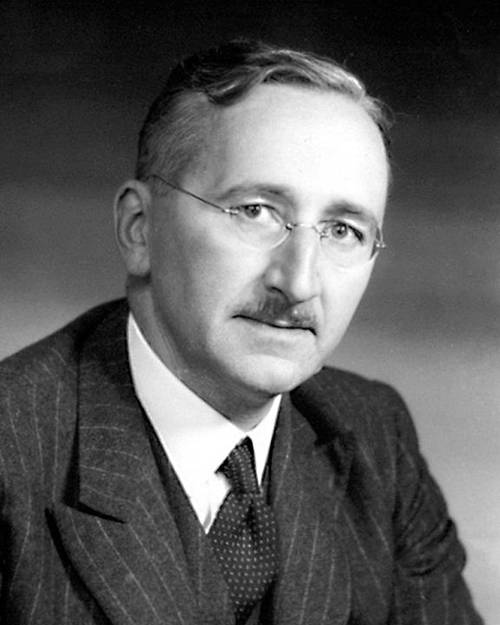
FAQ About Friedrich Hayek

Who was Friedrich Hayek?
Friedrich Hayek was an influential economist and philosopher known for his defense of classical liberalism and free-market capitalism. He was born on May 8, 1899, in Vienna, Austria, and became a key figure in 20th-century economic and political thought. Hayek was awarded the Nobel Prize in Economic Sciences in 1974 for his work on economic fluctuations and the interdependence of economic and social institutions.

What are Friedrich Hayek's most notable works?
Friedrich Hayek's most notable works include The Road to Serfdom (1944), which warns against the dangers of government control over economic decision-making, and The Constitution of Liberty (1960), where he champions individual freedom and limited government intervention. Another important work is Law, Legislation and Liberty, a three-volume series discussing the rule of law, liberty, and a spontaneous order in society.

What is Friedrich Hayek's connection to the Austrian School of Economics?
Friedrich Hayek was a leading figure in the Austrian School of Economics, a tradition that emphasizes individual choice, subjectivism in value theory, and the importance of spontaneous order in markets. The Austrian School advocates for limited government and a free-market economy, and Hayek's work significantly influenced these ideas, building on the foundation laid by other Austrian economists like Ludwig von Mises.

Why did Friedrich Hayek receive the Nobel Prize in Economic Sciences?
Friedrich Hayek was awarded the Nobel Prize in Economic Sciences in 1974, along with Gunnar Myrdal, for his pioneering work on the theory of money and economic fluctuations. Hayek's research highlighted how changes in the availability of money can affect production and employment, contributing significantly to our understanding of the business cycle and the economic complexities resulting from monetary policy.

What is the central theme of Hayek's book 'The Road to Serfdom'?
The central theme of Hayek's The Road to Serfdom is the danger of central planning and government control over economic life, which, according to Hayek, leads to repression and loss of individual freedom. He argues that economic control inevitably extends to all areas of life, thus leading societies towards totalitarian rule, as experienced in Nazi Germany and Soviet Russia during his time.

How did Friedrich Hayek influence libertarian thought?
Friedrich Hayek significantly influenced libertarian thought by advocating for individual liberty, limited government, and free-market capitalism. His works emphasize the importance of personal choice and the dangers of government overreach. Hayek's arguments have inspired many modern libertarians to champion policies that enhance individual freedom and economic liberty, forming a critical component of libertarian ideology today.

What is Friedrich Hayek's perspective on socialism?
Friedrich Hayek was a strong critic of socialism, which he believed led to the erosion of personal freedoms and ultimately to totalitarian states. In The Road to Serfdom, he argued that central planning and socialist policies restrict individual liberty and are incompatible with a free society. Hayek contended that socialism's focus on central control results in inefficiency, a lack of innovation, and loss of personal autonomy.

What is the 'spontaneous order' concept associated with Hayek?
The concept of "spontaneous order" is a central theme in Friedrich Hayek's work, describing the natural emergence of order in society from the voluntary activities of individuals, without the need for central direction. Hayek argued that complex social systems and economies could organize themselves efficiently through individuals' self-interested actions, guided by market prices and competition, thus demonstrating the limitations of centralized planning.

How did Friedrich Hayek view government intervention in the economy?
Friedrich Hayek was generally opposed to government intervention in the economy, advocating for minimalistic state influence to preserve individual freedom and economic efficiency. He believed that government actions tend to distort market signals, leading to inefficient outcomes and a reduction in personal liberties. Hayek supported government roles limited to protecting property rights, enforcing contracts, and maintaining peace to ensure the functioning of a market-based society.

What impact did Friedrich Hayek have on modern economic policy?
Friedrich Hayek's ideas have had a lasting impact on modern economic policy, particularly in promoting free-market principles and skepticism towards government intervention. His criticism of central planning and advocacy for economic freedom influenced the policies of leaders like Margaret Thatcher and Ronald Reagan, who implemented policies that reduced state control and emphasized market operations. His work continues to inform debates on economic freedoms versus regulatory controls.

What were Friedrich Hayek's views on democracy?
Friedrich Hayek valued democracy as a political system but warned against its inherent risks of majority rule potentially infringing on individual freedoms. He argued that democracy should be limited by the rule of law, ensuring that individual rights are safeguarded against the tyranny of the majority. Hayek's emphasis was on constitutional democracy, where governmental powers are checked and balanced to protect personal liberty and maintain economic freedom.

Did Friedrich Hayek have any notable collaborations or influences?
Friedrich Hayek collaborated and interacted with several renowned intellectuals, including Ludwig von Mises, with whom he shared a strong connection through the Austrian School. Hayek was also influenced by and influenced Karl Popper, another philosopher promoting open societies and scientific skepticism. These collaborations enriched his insights into the interconnectedness of economic structures and social institutions.

How did Friedrich Hayek's work impact political philosophy?
Friedrich Hayek's work significantly impacted political philosophy by providing a robust defense of liberal democracy and classical liberalism. He challenged collectivist ideologies and advocated for the protection of individual liberties as central to a prosperous society. His ideas have shaped discussions on the balance between state control and individual freedom and continue to be a reference point in debates on governance, liberty, and economic policy.

What is 'The Constitution of Liberty' about?
The Constitution of Liberty is one of Friedrich Hayek’s seminal works, published in 1960. It outlines his philosophical, economic, and political insights into liberty, proposing that true freedom is found in limited government and adherence to the rule of law. The work explores the relationship between freedom and governmental powers, advocating for a society where personal liberties are preserved, free enterprise is encouraged, and authoritarianism is abated.

What influence did Friedrich Hayek have on Margaret Thatcher?
Friedrich Hayek had a significant influence on Margaret Thatcher, the former Prime Minister of the United Kingdom. Hayek's ideas about free markets and limited government intervention strongly resonated with Thatcher, who integrated these principles into her economic and political policies during her tenure. His work inspired her to champion privatization, deregulation, and reduced state control over the economy, fundamentally shaping her government's approach to market economics.

Where did Friedrich Hayek teach during his academic career?
Friedrich Hayek taught at several renowned institutions throughout his academic career. He initially taught in Vienna and later joined the faculty of the London School of Economics. Hayek moved to the United States, where he taught at the University of Chicago, before relocating back to Europe where he continued his work at the University of Freiburg in West Germany, and later at the University of Salzburg in Austria.

What is Hayek's 'Law, Legislation and Liberty' about?
Law, Legislation and Liberty is a three-volume work by Friedrich Hayek that investigates the conceptual and practical aspects of law, democracy, and freedom. In these volumes, Hayek distinguishes between legislative law and the rule of law and emphasizes the role of a spontaneous order in societies. The books argue against social justice as a guiding principle of law and advocate for legal systems that support individual liberty and minimal governmental intervention.

How did Hayek's thought contrast with that of Keynes?
Friedrich Hayek's economic thought contrasted sharply with that of John Maynard Keynes. While Keynes advocated for active government intervention to manage economic cycles and promote employment through fiscal and monetary policies, Hayek opposed these measures, arguing that they would lead to economic inefficiencies and loss of freedom. Hayek favored market-driven solutions and believed government interference disrupted the natural equilibrium of free markets, causing more harm than good.

What legacy did Friedrich Hayek leave behind?
Friedrich Hayek left a profound legacy in both economics and political philosophy. His critique of government intervention and advocacy for free-market principles influenced generations of economists, policymakers, and political leaders. Hayek's pioneering ideas continue to spur debates on economic policy, the role of government, and individual freedom, marking him as one of the central figures in modern liberal thought and a champion of economic freedom and liberty.

What were Friedrich Hayek's contributions to the understanding of price signals?
Friedrich Hayek made significant contributions to our understanding of price signals in the economy. He elucidated how price signals are essential for conveying information in markets, helping to coordinate decentralized decision-making among individuals. According to Hayek, prices reflect the collective knowledge and preferences of market participants, guiding efficient resource allocation without the need for centralized control, thus emphasizing the limits of government intervention in economic planning.
